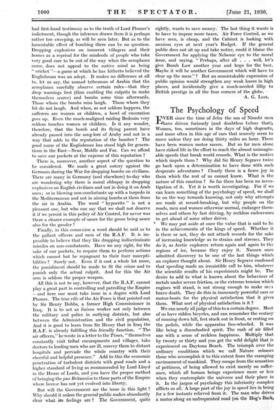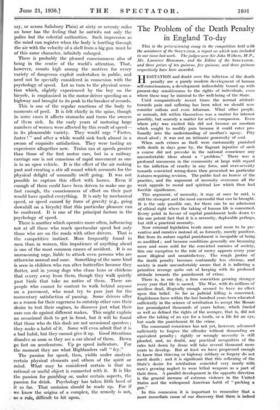The Psychology of Speed
F-LIVER since the time of Jehu the son of Nimshi men v4have driven furiously (and doubtless before that), Women, too, sometimes in the days of high dogcarts, and more often in this age of cars that scarcely seem to move unless they are doing thirty miles an hour. There have been women motor racers. But so far men alone have risked life in the effort to reach the almost unimagin- able speeds that break world records. What is the motive which impels them ? Why did Sir Henry Segrave twice go back upon a determination to have done with such desperate adventures ? Clearly there is a fierce joy in them which the rest of us cannot know. What is the nature of this emotion ? So far there has been no inves- tigation of it. Yet it is worth investigating. For if we can learn something of the psychology of speed, we shall be on the way towards knowing, not only why attempts are made at record-breaking, but why people on the roads, men and women otherwise normal, endanger them- selves and others by fast driving, by reckless endeavours to get ahead of some other driver.
• We may put aside at once the value that is said to lie in the achievements of the kings of speed. Whether it is there or not, they do not attack records for the sake of increasing knowledge as to strains and stresses. They do it, as Arctic explorers return again and again to the regions of ice, because they enjoy it. Nansen once admitted discovery to be one of the last things which an explorer thought about. Sir Henry Segrave confessed that speeding made an irresistible call to him, whatever the scientific results of his experiments might be. The desire to add to what is known about the behaviour of metals under severe friction, or the extreme tension which engines will stand, is not strong enough to make men brave death. They do this in immensely powerful cars or motor-boats for the physical satisfaction that it gives them. What sort of physical satisfaction is it ?
We can nearly all judge of this to a certain degree. Most of us have ridden bicycles, and can remember the ecstasy of running down hill, feet stuck out in front, or resting on the pedals, while the apparatus free-wheeled. It was like being a disembodied spirit. The rush of air filled one with a sense of reckless happiness. Multiply that by twenty or thirty and you get the wild delight that is experienced on Daytona Beach. The triumph over the ordinary conditions which we call Nature releases these who accomplish it to this extent from the cramping environment of mankind. They escape from the sensation of pettiness, of being allowed to exist merely on suffer- ance, which all human beings experience more or less when they contemplate the universe and their place in it. In the jargon of psychology this inferiority complex afflicts us all.- A large part of the joy in speed lies in being for a few instants relieved froth it. The man who drives it motor along an unfrequented' road (on the Hog's Back, say, .or across Salisbury Plain) at sixty or seventy miles an hour has the feeling that he outwits not only the police but the celestial authorities. Such impression as the mind can register when,the body is hurtling through the air with the velocity of a shell from a big gun must be of this same character, infinitely enlarged.
There is probably the pleased consciousness also of being in the centre of the world's attention. That, however, counts high among the motives for every variety of dangerous exploit undertaken in public, and need not be specially considered in connexion with the psychology of speed. Let us turn to the physical sensa- tion which, slightly experienced by the boy on the bicycle, is emphasized in the motor-driver speeding on a highway and brought to its peak in the breaker of records.
This is one of the regular reactions of the body to moments of peril. It is felt chiefly in the spine, though in some cases it affects stomachs and turns the owners of them sick. In the early years of motoring large numbers of women were affected by this result of speed— in its pleasurable variety. They would urge " Faster, faster ! " and after a while would sink back almost in a swoon of exquisite satisfaction. They were tasting an experience altogether new. Trains ran at speeds greater than those of the first motor cars, but in a railway carriage one is not conscious of rapid movement as one is in an open vehicle. It is the effect of the air rushing past and creating a stir all round which accounts for the physical delight of unusually swift going. It was not possible to capture this effect with horses. Even if enough of them could have been driven to make one go fast enough, the consciousness of effort on their part would have spoiled everything. It is only by mechanical speed, or speed caused by force of gravity (e.g., going downhill on a bicycle) that this particular pleasure can be conferred. It is one of the principal factors in the psychology of speed.
There is another which operates more often, influencing not at - all those who reach spectacular speed but only those who are on the roads with other drivers. That is the competitive instinct. More frequently found in men than, in women, this impatience of anything ahead is one of the most common causes of accident. It is an unreasoning urge, liable to attack even persons who are otherwise normal and sane. Something of the same kind is seen in children who run after butterflies because they flutter, and in young dogs who chase hens or chickens that scurry away from them, though they walk quietly past birds that take no notice of them. There arc people who cannot be content to walk behind anyone on a pavement, who must try to pass just for the momentary satisfaction of passing. Some drivers offer as a reason for their eagerness to outstrip other cars their desire to test their engines, to discover just what their cars can do against different makes. This might explain an occasional dash to get in front, but it will be found that those who do this dash are not occasional speeders ; they make a habit of it.. Some will even admit that it is a bad habit, but they cannot give it up. Good intentions dissolve as soon as they see a car ahead of them. Down go feet on accelerators. Up go speed indicators. For the moment they are what Highlanders call " fey."
The passion for speed,- then, yields under analysis certain physical elements and others of the spirit or mind. What may be considered certain is that no rational or useful object is connected with it. It is like the passion for gambling or, under certain aspects, the passion for drink. Psychology has taken little heed of it so far. That omission should be made up. For if we know the origins of a complex, the remedy is not, as a rule, difficult to hit upon.









































 Previous page
Previous page